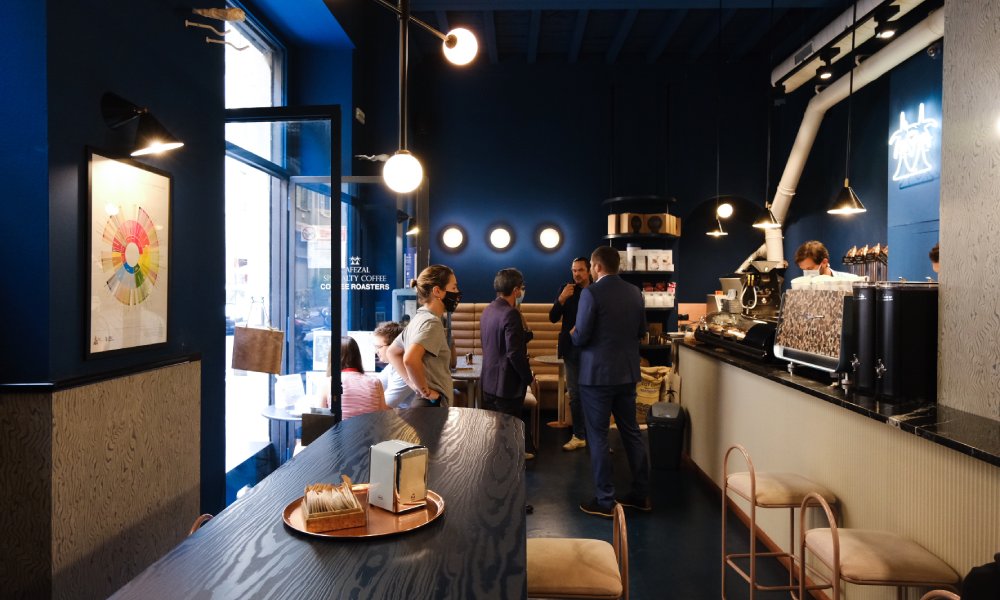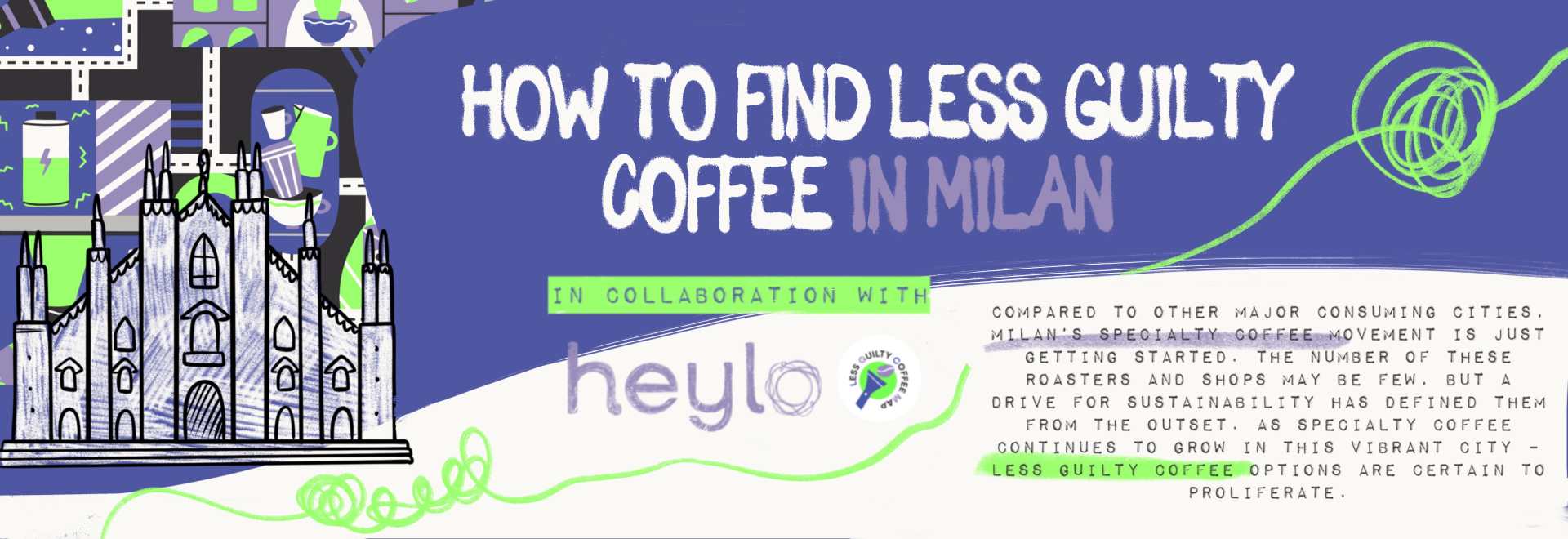How to find less guilty coffee in Milan
Ben Mitchell talks with Carlos Bitencourt about where to find less guilty coffee in Milan
In many coffee bars across Italy, customers can still enjoy an espresso for €1. The price cap specifically relates to “caffé al banco”, which means coffee consumed while standing at the bar.
It’s a government initiative aimed at preserving the cultural practice of enjoying espresso in public spaces.
But while a €1 espresso may benefit Italian consumers, can such a low price adequately compensate for sustainability efforts across the coffee supply chain?
In recent years, brave pioneers have led the specialty coffee movement in cities across the country – aiming not to diminish classic Italian espresso culture, but to coexist with it and shed new light on what coffee is (or can be).
Sustainability has become a key driving force behind this movement; and given its status as Italy’s most cosmopolitan city – renowned for its fashion, design, and fine cuisine – it makes sense that Milan is leading the charge.
This article is the second in a series exploring the most ethical businesses within four major coffee-consuming cities: Barcelona, Milan, Sydney, and London.
In collaboration with Heylo Coffee, the series will explore coffee roasters and shops that provide a sustainable cup of coffee; from sourcing practices and the value they deliver at origin to the packaging they use and their impact on the environment.
These businesses can also be found on Heylo’s Less Guilty Coffee Map – which provides an interactive guide for coffee lovers to explore the most sustainable, ethical options across the world.
This project is a natural extension of Heylo’s value system. Their machines use induction heating, which not only offers superior control and greater precision over brewing parameters compared to traditional boiler systems, but also significantly reduces energy consumption. Indeed, energy efficiency was a key motivation behind the development of these machines.
So, who are these “less guilty coffee” brands?

Cafezal
Opening in 2017, Cafezal is one of the trailblazers – setting a benchmark for specialty coffee across Milan.
“Cafezal” means “coffee farm” in Portuguese. This immediately reflects owner Carlos Bitencourt’s commitment to ethical sourcing and maintaining strong relationships further up the supply chain.
“I always gave preference to real direct trade, and many times I waited longer to get the coffees I wanted in order to do it in a direct and transparent manner,” he says. “Being Brazilian, I regularly buy coffees from great local producers in the mountains of Matas de Minas and in the region of Cerrado, and Mantiqueira de Minas – great producers like Alexandre Emerich and Jhone Lacerda.
“We work on direct trade with many other countries too, like Ethiopia, where I work with 2 farmers from Guji and Sidamo; Panama, where I work with 3 local farmers; Indonesia, where I work with 2 local farmers – one from Bali and another from Flores. These days I am developing some new partners in Colombia and Peru.”
Other countries Carlos sources from are Bolivia, Kenya, Nicaragua, Panama, and East Timor.
“Nowadays we have around 75% direct trade, but our plan is to grow further,” Carlos says.
Beyond its sourcing practices, Cafezal has consistently strived to minimise its environmental impact and was among the first coffee businesses in Milan to implement recyclable and compostable packaging.
“We have always been perceived as a company with good and sustainable practices and we noticed that the customers liked recyclable and compostable packaging,” says Carlos. “It is a pillar for the company’s branding and growth.”
Carlos is continually exploring other ways to reduce waste – going further afield than the industry’s more commonly adopted practices. Indeed, Cafezal is aligning with the broader goal of developing a circular economy – steering towards more sustainable and efficient resource use.
“We are currently working on an internal project to recycle and reuse by-products from coffee production,” he says. “The idea is to re-use products the industry has thrown away for years, which I believe we could be using with small transformation processes.”
Cafezal has certainly been a forerunner in Milan’s specialty coffee movement. However, Carlos now sees other businesses emerging that can also hold the torch for specialty coffee – and the values that come with it.
“I think other coffee businesses in Milan are generally doing a great job, with great quality coffee, food and pastries,” he says. “It is a sort of ‘winning loop’, where customers see and recognise the quality and commitment in such causes, but also keep pushing us to do even better.
“We are still a small group of coffee businesses in Milan, but the awareness is growing more and more.”
Other less guilty coffee options
Nowhere Coffee Roasters opened at the beginning of the pandemic. They exclusively use single origin coffees that allows them to enhance traceability and sustainability throughout the supply chain.
They buy fresh, seasonal crop directly from producers, as well as from importers they can trust to uphold their sourcing values and convey transparent information about the coffee farms. By paying fair prices, they help farmers gain more value and support the production of high-quality coffee.
While they continue to explore new micro lots, they also recognise the importance of maintaining long-term, stable trading relationships with farmers.
ONEST serves specialty coffee, food, and wine with a focus on environmental responsibility. They carefully select their products with traceability and sustainability in mind.
They aim to showcase the dedication and passion of small producers in every coffee and plate they serve – emphasising the intrinsic quality of the raw materials. At the same time, their focus isn’t solely on perfection, but also on using waste and by-products in original and innovative ways.
Onest encourages a level of mindfulness so that customers can better appreciate where their coffee and food have come from – and how they got there.
Sami is “inspired by the wonders offered by Peru’s altitudes”. They aim to guide customers towards more informed choices. Their products are carefully chosen from small, local Peruvian businesses that respect “pacha mama” (Mother Earth).
They are committed to promoting unity between the global south and north by embracing the concept of “ayni” – a vision of reciprocity and respect, and a recognition of the interconnectedness of all things.
In practice, this means establishing a relationship with their trading partners based on respect and dignity – and a mutual appreciation for environmental responsibility. For Sami, trade is not just a transaction, but a chance to affect positive change.
Lot Zero believes that knowing factors such as the origin, variety, and altitude of your coffee is essential in specialty coffee – serving not only as quality indicators but also in ensuring a less guilty coffee experience.
Orsonero Coffee spearheaded Milan’s specialty coffee movement, along with Cafezal. They work with established specialty coffee roasters, such as La Cabra and Fjord, who follow responsible sourcing practices.
Compared to other major consuming cities, Milan’s specialty coffee movement is just getting started. The number of these roasters and shops may be few, but a drive for sustainability has defined them from the outset. As specialty coffee continues to grow in this vibrant city – less guilty coffee options are certain to proliferate.
New Ground Coffee
Want to read more articles like this? Sign up for our newsletter!







